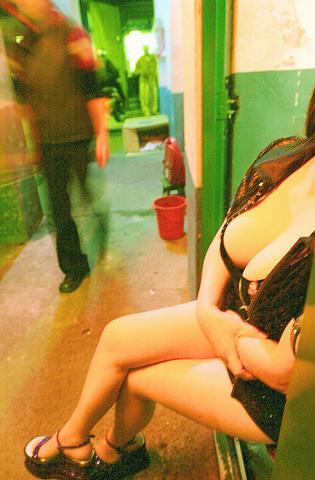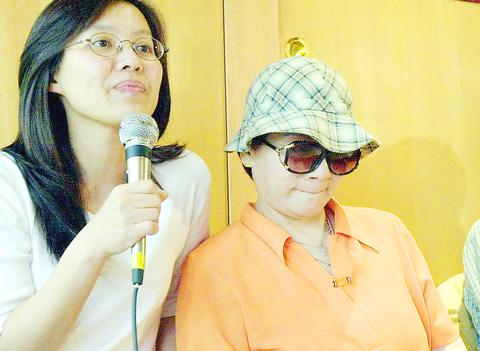Yi Mei (
But it's not easy for a legal prostitute such as her to change jobs, given Yi's age and limited education.

PHOTO: LIAO RAY-HSANG, TAIPEI TIMES
"It has been my ultimate goal to change jobs since the first day I got in [the profession]," Yi said, adding that she would like to open a shop of her own.

PHOTO: CHIANG YING-YING, TAIPEI TIMES
Yi Mei is one of 57 women participating in the city government's two-year job training program for legal prostitutes.
As the city is set to turn out the red lights on Wednesday when legalized prostitution comes to an end, feminists and women's groups continue to debate the pros and cons of Taiwan's sex trade -- which operates out of massage parlors, tea houses and barber shops.
While some workers have asked the city to set up a special zone where they can continue to work, the city has not yet decided its future policy on prostitution, though it has set up a task force to conduct a study on the sex industry.
Sister Kuan (
"It will definitely force legal prostitutes underground," said Kuan, who has been lobbying on the behalf of sex workers since former Taipei mayor Chen Shui-bian (
The city has offered financial incentives to encourage licensed prostitutes to change jobs.
But Kuan said that about one third of the current 45 legal prostitutes, who work in the city's two public brothel zones in the Wanhua and Tatung districts, might end up joining the ranks of an estimated 100,000 illegal prostitutes in Taiwan.
Oldest profession
Legal prostitution in post-colonial Taiwan in part dates to 1949, when KMT forces fled China to Taiwan.
To take care of the sexual needs of soldiers who were either young and single or married and away from home, the central government in 1959 proposed the "Taiwan Provincial Prostitution Management Measures" (台灣省娼妓管理辦法) to "ensure social order."
The measures -- which were later revised in 1973 and 1994 -- stipulated that 70 percent of a customer's fee should go to the sex worker, with the remaining 30 percent going to an establishment's proprietor. The measures also required that sex workers undergo a physical check-up every two weeks.
In 1995, then-Taipei mayor Chen Shui-bian staged a successful "anti-obscenity" campaign in an attempt to "clean up" the city's streets.
On Sept. 4, 1997, the city announced a ban on legal prostitution. Two days later, the ban was officially carried out, prompting 128 legal sex workers to take to the streets to stage what ended up being a 17-month battle over the issue.
Finally, on Jan. 26, 1999, the new city government under Mayor Ma Ying-jeou (
In March that same year, the city launched a two-year "Rainbow Program" (
Those interested in opening a business of their own were entitled to loans of NT$600,000 interest-free, and those who wanted to pursue a new job were eligible for NT$10,000 in monthly subsidies.
According to Yu Shu-chen (
These women have opened businesses such as beauty parlors, restaurants or auto body shops, or have taken new jobs as babysitters or housekeepers.
Financial support, however, hasn't guaranteed success. Just half of the 57 women participating in the program have successfully started or transferred to new jobs.
"They have a hard time finding a new job or establishing a business of their own because they're either old, poorly educated, have long ago lost contact with society or lack professional skills," Yu said.
Studies show that the ages of legal prostitutes working in the Wanhua District range between 25 and 40, while those in Tatung District range between 40 and 60.
In addition to the "Rainbow Program," the city also offered until the end of this month monthly allowances of NT$7,750 to licensed prostitutes trying to change careers.
Chang Mei-mei (
"Each [legal worker] comes from a very different family and has a unique personality, and you simply cannot force them to come to you and ask for help," Chang said.
Chang said the division has handled 56 cases over the past two years.
Playing by the rules
Although the city has not yet mapped out its future prostitution policy, Jeng Tsuen-chyi (鄭村棋), director of city's Bureau of Labor Affairs (勞工局), said that he personally does not approve of the idea of forcing prostitutes into changing jobs.
"They're entitled to do any job of their choice just like you and I," Jeng said. "The city shouldn't have assumed the responsibility of helping them change jobs, but instead it should step in to help whenever they need it."
But Jeng also said he wouldn't support any further attempts to regulate the sex industry.
"Only through the end of legal prostitution can the public start to face the problem of prostitution as a whole, and further discuss the issue and come up with possible solutions," Jeng said.
When asked whether he approves of prostitution, Jeng said that he can accept prostitution on the condition that sex workers are not forced into the business or exploited by pimps or agents.
"I don't think the city has any right to force sex workers out of the game when they're willing to play by the rules and when there are reasonable and acceptable rules to follow," he said. "The city government should stop acting like a hypocrite and start facing the problem head on."
Commenting on the city's proposal to make the two red light districts into special zones encompassing sex museums staffed with former sex workers as curators or tour guides, Jeng said that it sounded like a "creative idea."
"Sex education is an important subject which has long been ignored and desperately needs attention. Sex workers might be good candidates to offer some unique and useful insight into the controversial issue," he said.
Pros and cons
Despite the city's uncertain prostitution policy, feminists and women's groups have been vigorously debating the pros and cons of the sex trade.
Kuan said that a good way to tackle the problem is to set up a special zone where prostitutes can continue to work.
"Prostitution helps keep crime rates down. Crackdowns and prohibition simply don't work," she said. "The Kuantu prairie may be a good choice for the special zone because not many people live there. Paotou Borough may not be a bad choice either, but I'm afraid that government officials who own land there may not like the idea."
Paotou Borough in the Wanhua District was the city's first legal brothel area. During its peak, there were 60 public brothels located there.
But Huang Shu-ling (黃淑玲), research fellow at Academia Sinica and chairwoman of the Women's Rescue Foundation (婦女救援基金會), dismisses the argument that prostitution helps keep crime rates low, especially rape.
"Studies have shown that most rapists have a long history of patronizing prostitutes. In other words, prostitution doesn't help decrease rape crimes," she said.
To tackle the problem, Huang said, the central government should amend the Social Order Maintenance Law (
"The law just doesn't make any sense at all because it punishes the prostitutes instead of the brothel patrons when busts are made," Huang said.
Wang Ping (
"Only when the industry is decriminalized is it possible to talk about something else," she said.
Josephine Ho (何春蕤), coordinator of the Center for the Study of Sexuality at National Central University (中央大學), said that she is against any measure that deprives women of their right to work.
"Prostitution actually is a good job in terms of pay and working conditions," she said. "It's not fair to say that all sex work is desperate and painful."
Activist Chou Chun-chu (周君竺), secretary to the Tatung District Public Brothel Organization (大同區公娼自治會), said that legal prostitutes have seen their business dwindle in recent years due to a slowing economy and the ban on legal prostitution.
"Some don't even have a single customer in 12 hours, while in the 1960s, a popular prostitute could have as many as 20 customers a day," Chou said. "Our own study indicates that about half of the legal prostitutes in the Tatung District have declared retirement, while the other half are in the process of changing their jobs."

LONG FLIGHT: The jets would be flown by US pilots, with Taiwanese copilots in the two-seat F-16D variant to help familiarize them with the aircraft, the source said The US is expected to fly 10 Lockheed Martin F-16C/D Block 70/72 jets to Taiwan over the coming months to fulfill a long-awaited order of 66 aircraft, a defense official said yesterday. Word that the first batch of the jets would be delivered soon was welcome news to Taiwan, which has become concerned about delays in the delivery of US arms amid rising military tensions with China. Speaking on condition of anonymity, the official said the initial tranche of the nation’s F-16s are rolling off assembly lines in the US and would be flown under their own power to Taiwan by way

CHIP WAR: The new restrictions are expected to cut off China’s access to Taiwan’s technologies, materials and equipment essential to building AI semiconductors Taiwan has blacklisted Huawei Technologies Co (華為) and Semiconductor Manufacturing International Corp (SMIC, 中芯), dealing another major blow to the two companies spearheading China’s efforts to develop cutting-edge artificial intelligence (AI) chip technologies. The Ministry of Economic Affairs’ International Trade Administration has included Huawei, SMIC and several of their subsidiaries in an update of its so-called strategic high-tech commodities entity list, the latest version on its Web site showed on Saturday. It did not publicly announce the change. Other entities on the list include organizations such as the Taliban and al-Qaeda, as well as companies in China, Iran and elsewhere. Local companies need

CRITICISM: It is generally accepted that the Straits Forum is a CCP ‘united front’ platform, and anyone attending should maintain Taiwan’s dignity, the council said The Mainland Affairs Council (MAC) yesterday said it deeply regrets that former president Ma Ying-jeou (馬英九) echoed the Chinese Communist Party’s (CCP) “one China” principle and “united front” tactics by telling the Straits Forum that Taiwanese yearn for both sides of the Taiwan Strait to move toward “peace” and “integration.” The 17th annual Straits Forum yesterday opened in Xiamen, China, and while the Chinese Nationalist Party’s (KMT) local government heads were absent for the first time in 17 years, Ma attended the forum as “former KMT chairperson” and met with Chinese People’s Political Consultative Conference Chairman Wang Huning (王滬寧). Wang

CROSS-STRAIT: The MAC said it barred the Chinese officials from attending an event, because they failed to provide guarantees that Taiwan would be treated with respect The Mainland Affairs Council (MAC) on Friday night defended its decision to bar Chinese officials and tourism representatives from attending a tourism event in Taipei next month, citing the unsafe conditions for Taiwanese in China. The Taipei International Summer Travel Expo, organized by the Taiwan Tourism Exchange Association, is to run from July 18 to 21. China’s Taiwan Affairs Office spokeswoman Zhu Fenglian (朱鳳蓮) on Friday said that representatives from China’s travel industry were excluded from the expo. The Democratic Progressive Party government is obstructing cross-strait tourism exchange in a vain attempt to ignore the mainstream support for peaceful development